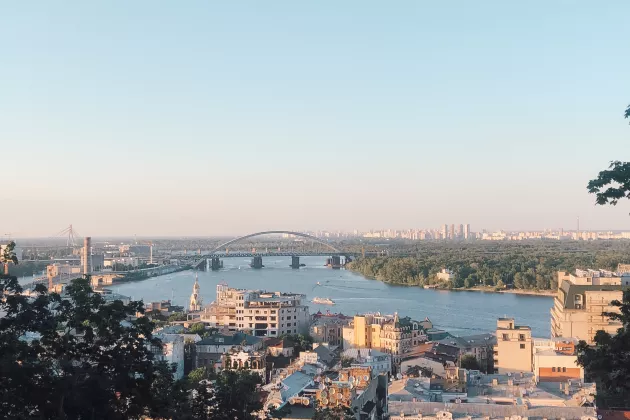LTH and Lund University recently received a visit from the Taras Shevchenko National University of Kyiv – and during a seminar organised by the Faculty of Medicine, members of the Ukrainian university’s management talked about how they worked when Russia’s large-scale invasion of Ukraine commenced.
Something that perhaps surprised many people is that the University of Kyiv – with close to 30,000 students – rapidly became an important problem-solver and hub when housing was destroyed, and food and water shortages arose.
In the initial phase of the war, it was not only students and staff who sought help from the university on a range of different matters, but also “ordinary” city residents, said Ganna Tolstanova, professor and vice-rector for Scientific Work.
“The fact that people had problems getting food, special diet foods, diabetes medicines and water became de facto the university’s problem. It could be said that it was lucky that we had experience from Covid. We quickly set up free telephone lines for support and mental health.”
According to her, everyone was faced with a difficult choice when war broke out:
“I was compelled to ask myself: am I to be a vice-rector or mother? We were all scared and forced to choose.”
Students were the priority.
Students were encouraged at an early stage to get to safety and find bomb shelters, which were located on campus and elsewhere. For the management, the priority was maintaining contact with the students.
Volodymyr Ilchenko, professor and first vice-rector at the University of Kyiv, could not get to work on 24 February because the bridges had been bombed. However, he and his management colleagues worked via digital systems and were determined to remain in the capital:
“We weren’t going anywhere, that was our plan. Students and teaching staff on the other hand were free to go. In retrospect, I think it was a good plan.”
Escape and a suspended semester
The day after the Russian invasion, the Ministry of Education recommended that all universities in Ukraine have a recess for two weeks. Many students and teaching staff quickly headed west within the country, and often to partner universities.
“In the first few days, the questions concerned: Where is the government? Where are we to go and what are each of us to do …? We were to be ready to resist. Two weeks later we understood that we must get back to education,” said Volodymyr Ilchenko.
During the Covid-19 pandemic, they had worked using remote teaching, which made things easier when many students and teaching staff were fleeing for their lives:
“Suddenly we also had students and teaching staff in Chile, Australia and Japan.”
The University of Kyiv quickly discovered that a functioning administration was important. For example, they wanted to rapidly employ people who had unclear employment conditions or were “on the way in” to the system – as contracts and a livelihood were palpably a matter of life and death.
Flexibility was another matter of survival.
“We saw, for example, that it was the university’s responsibility to ensure final-year students could receive their diplomas, and that individual assessments and solutions must be in place to manage the uncertainty surrounding the student’s situation. That was our main task, to ensure that the students could move forward,” said Ganna Tolstanova.
Work and communication according to the crisis management plan
The university and its management worked using chat channels according to a reporting model that had been previously developed specifically for crisis situations. Surprisingly, the internet worked well despite the armed conflict – and online meetings were held at an early stage with all or many members of staff.
A dilemma …
Towards the end of the seminar, a young man in the audience asked the panel for their view on a dilemma:
“Should I go back to Ukraine and fight, or stay in Sweden and learn for the future?”
The answers from the panel equated to: It is a very personal choice. Perhaps it is better to come back to Ukraine, in order to rebuild the country with your increased knowledge.


